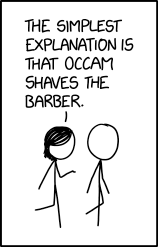Occam

Oh no, Murphy just picked up the razor.

Oh no, Murphy just picked up the razor.
This comic invokes three philosophical topics: Occam's Razor, the Barber Paradox, and Murphy's Law.
Occam's Razor is the principle that explanations should not postulate more entities than necessary. It is often phrased as "the simplest explanation is best". The word 'razor' is intended to evoke the image of shaving off superfluous elements.
The Barber Paradox postulates a town barber who shaves all those, and those only, in the town who don’t shave themselves, and asks whether the barber shaves himself. The paradox is that if he does, then he shouldn’t, and if he doesn’t, then he should. It is an attempt at a concrete, real-world analog of Russell's Paradox in set theory.
Megan tries to invoke Occam's Razor to create a simpler solution to the paradox. Occam's Razor is named in honor of philosopher William of Ockham (Ockham being a town in England) and she declares that William shaves the barber. Her proposal is humorous and does not of course resolve the paradox, as the barber is still not shaving himself (so he should shave himself, so he shouldn't shave himself...)
The title text invokes Murphy's Law: the expectation that "anything that can go wrong will go wrong." When you shave with a cut-throat razor, there are multiple things that could go wrong, many of which would cause harm to the person being shaved. Alternatively, invoking Murphy's law makes the principle of Occam's Razor itself or its use in the comic, "go wrong", possibly rendering the solution invalid.